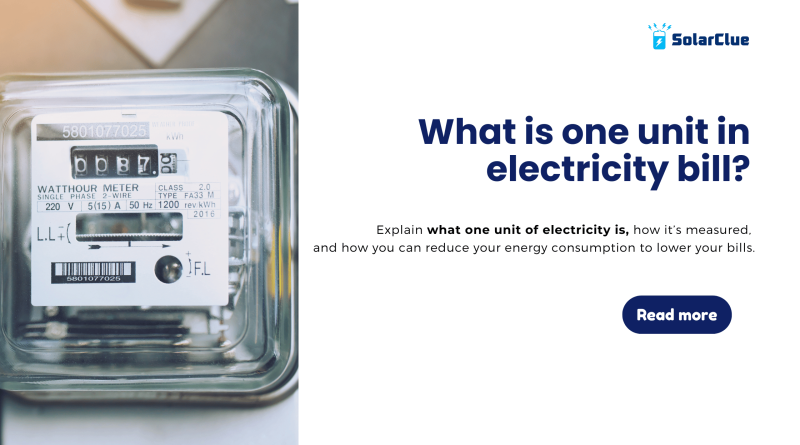What is one unit in electricity bill?
When you receive your electricity bill, you’ll often see charges based on the number of units of electricity you’ve consumed. But what exactly does one unit of electricity mean?
In this blog, we’ll explain what one unit of electricity is, how it’s measured, and how you can reduce your energy consumption to lower your bills. Additionally, we’ll explore how switching to solar power can help you significantly cut down on your electricity costs.
Table of Contents
- 1 What Does One Unit Mean in an Electricity Bill?
- 1.1 How is Electricity Consumption Measured?
- 1.2 Examples of Electricity Consumption in Units
- 1.3 How to Calculate Electricity Consumption for Your Appliances
- 1.4 How to Reduce Electricity Consumption and Save on Bills
- 1.5 How Solar Power Can Help You Save on Electricity Bills
- 1.6 Why Choose SolarClue for Your Solar Power Needs?
- 1.7 Reduce Your Electricity Bill with SolarClue Today!
What Does One Unit Mean in an Electricity Bill?
In the context of electricity billing, one unit refers to one kilowatt-hour (kWh) of electricity. A kilowatt-hour is a standard unit of energy used to measure electricity consumption.
1 unit = 1 kWh (kilowatt-hour)
This means if you use a 1-kilowatt (1000 watts) electrical device for one hour, you’ve consumed 1 unit of electricity.
How is Electricity Consumption Measured?
Electricity consumption is measured by an electric meter installed at your home or business. The meter records the total amount of electrical energy you use in kilowatt-hours (kWh) over a period of time, usually a month or billing cycle.
The number of units (kWh) is then multiplied by the tariff rate set by your electricity provider to calculate your total bill amount.
Examples of Electricity Consumption in Units
To understand how many units your home appliances use, here are some examples of common household devices and their energy consumption:
| Appliance | Power Rating (Watts) | Usage Time | Units Consumed |
|---|---|---|---|
| Ceiling Fan | 75 watts | 10 hours/day | 0.75 units/day |
| Refrigerator | 150 watts | 24 hours/day | 3.6 units/day |
| Air Conditioner (1.5 Ton) | 1500 watts | 8 hours/day | 12 units/day |
| LED Bulb | 10 watts | 5 hours/day | 0.05 units/day |
| Washing Machine | 500 watts | 1 hour/day | 0.5 units/day |
In these examples, the power rating of each appliance is multiplied by the number of hours it’s used to calculate the number of units (kWh) consumed.
How to Calculate Electricity Consumption for Your Appliances
To calculate the electricity consumption of any appliance, you can use this simple formula:
Units (kWh)=Power Rating (watts)×Usage Time (hours)
For example:
- If you run a 1000-watt appliance (1 kW) for 2 hours, it will consume 2 units (kWh) of electricity.
Units consumed=1000×21000=2 units (kWh)
How to Reduce Electricity Consumption and Save on Bills
Now that you know how electricity is measured in units, here are some tips to help you reduce your energy consumption and lower your electricity bills:
1. Switch to Energy-Efficient Appliances
Use energy-efficient appliances like LED bulbs, inverter air conditioners, and Energy Star-rated devices. These appliances consume less electricity and help you save on energy costs.
2. Turn Off Appliances When Not in Use
Unplug devices like TVs, chargers, and kitchen appliances when they’re not in use to avoid phantom power consumption.
3. Use Power Strips
Use smart power strips to prevent unnecessary power usage by automatically shutting off power to devices that aren’t in use.
4. Optimize Air Conditioner Usage
Air conditioners consume a lot of electricity. Set your AC to 24-26°C for optimal efficiency and use ceiling fans to circulate the cool air.
5. Switch to Solar Power
One of the most effective ways to reduce your electricity bills over the long term is by switching to solar power. By generating your own electricity, you can drastically lower your dependence on grid electricity and reduce the number of units you consume.
How Solar Power Can Help You Save on Electricity Bills
While reducing energy consumption with efficient appliances and smart usage helps, the most impactful way to cut your electricity costs is by switching to solar energy. Here’s how solar power can help:
1. Drastically Lower Your Bill
Solar power allows you to generate electricity from the sun, which reduces or eliminates the need for grid electricity. By producing your own energy, you’ll consume fewer units from the grid, leading to much lower bills.
2. Protect Against Rising Tariffs
Electricity tariffs are likely to rise over time due to inflation and increased energy demand. By generating your own solar power, you’ll be insulated from these price hikes and enjoy stable energy costs.
3. Long-Term Savings
While there’s an initial investment to install a solar power system, the long-term savings are significant. Most solar systems pay for themselves in 4-7 years, after which you’ll enjoy free electricity for the next 25 years or more.
4. Environmentally Friendly Energy
Solar power is a clean, renewable source of energy that doesn’t produce carbon emissions. By switching to solar, you reduce your carbon footprint and contribute to a more sustainable future.
Why Choose SolarClue for Your Solar Power Needs?
If you’re looking to reduce your electricity bills and switch to clean energy, SolarClue is the perfect partner for your solar power journey. Here’s why SolarClue is the best choice:
1. Premium Solar Products
SolarClue offers top-quality solar panels, inverters, and batteries from trusted brands like Tata Power Solar, Luminous, Havells, and Sukam. These products ensure maximum efficiency and durability.
2. Personalized Solar Solutions
Every home and business has unique energy needs. SolarClue provides customized solar solutions tailored to your consumption patterns and budget, ensuring that you get the best return on your investment.
3. Comprehensive Service
From consultation and system design to installation and ongoing support, SolarClue offers end-to-end service, ensuring a smooth transition to solar energy.
4. Financial Benefits
SolarClue helps customers take advantage of government subsidies, tax incentives, and flexible financing options, making solar power more affordable than ever.
Reduce Your Electricity Bill with SolarClue Today!
If you’re ready to reduce your electricity bills and take control of your energy costs, now is the perfect time to switch to solar power with SolarClue. By harnessing the power of the sun, you can significantly lower your electricity consumption and contribute to a greener, more sustainable future.
Contact SolarClue today for a free consultation and learn how solar power can help you save on your electricity bill. Start your journey to energy independence with SolarClue!
FAQs
1. What does one unit of electricity mean?
One unit of electricity is equal to 1 kilowatt-hour (kWh), which is the amount of energy consumed by a 1-kilowatt device running for 1 hour.
2. How can I reduce my electricity consumption?
You can reduce your electricity consumption by using energy-efficient appliances, turning off devices when not in use, and switching to solar power to generate your own electricity.
3. Does SolarClue offer financing options for solar installations?
Yes, SolarClue provides flexible financing options and helps customers access government subsidies to make solar power more affordable.
4. How long does it take for a solar power system to pay for itself?
Most solar power systems have a payback period of 4-7 years, after which you’ll enjoy free electricity for the remaining life of the system.
5. How much can I save by switching to solar power?
Switching to solar power can reduce your electricity bill by 50-90%, depending on the size of your system and energy consumption.


